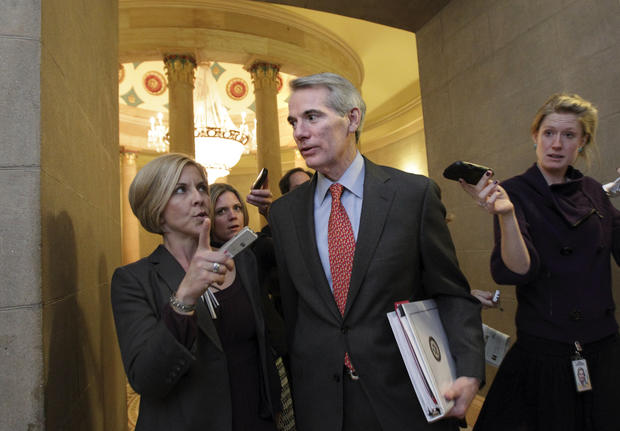Supercommittee: One week to deadline, is compromise possible?
With just one week left to identify $1.2 billion in savings, Democrats and Republicans on the bipartisan Congressional "supercommittee" are deeply at odds -- not just over policy, but over whose move it is.
"I am still hopeful that the Republicans will see their way to bringing to us a real revenue package," Democratic Senator Patty Murray said Wednesday, as she headed out of yet another meeting with the five other Democrats on the committee.
But her co-chair on the supercommittee, Texas Republican Rep. Jeb Hensarling, insisted a few hours later that the ball was actually in the Democrats' court. "I'm waiting for the Democrats to put fundamental reform on the table. I'm not going to negotiate against myself," Hensarling said during a break from his meeting with fellow Republican supercommittee members.
Republican aides say they have been waiting for a response from Democrats ever since they issued their most recent proposal last Monday, November 7th. They say Murray informed Hensarling on Friday that the Democrats were working on a counterproposal and would get something to him shortly.
Democratic aides contend that the onus is actually on Republicans to produce a new proposal, because their last one was "not serious." That proposal would have increased tax revenues by $300 billion by eliminating some loopholes, but it also would have made the Bush tax cuts permanent, which Democrats say would add $4 trillion to the deficit.
"If you add 4 trillion dollars to the debt and decrease the debt by 300 billion, by my simple math you're losing 3.7 trillion dollars," Rep Xavier Becerra (D-CA) told CBS News. "That doesn't make the problem better, it makes the problem worse."
The strained negotiations were thrown into greater doubt Tuesday night, when Hensarling appeared to issue an ultimatum. In an interview on CNBC, he said Republicans have "gone as far as we can go" on tax increases.
"I hope they have not walked away," Senator Murray said this morning. Her Democratic colleague, Senator John Kerry (D-MA), implied Hensarling had broken the supercommittee's informal guidelines. "We've been really working hard not to negotiate in public, and not to negotiate thru you folks," Kerry told reporters.
By Wednesday afternoon, Hensarling had walked back his comments, saying that he had only meant that he would move from his negotiating point without a counteroffer from Democrats.
CBSNews.com special report: America's debt battle
"I'm not rejecting any offer out of hand. Quite the opposite, I'm still waiting for a new offer to be put on the table," Hensarling said, adding, "I have been waiting since mid-August for an offer that actually reforms our entitlement spending and solves the problem. I'm still looking forward to that, and should that come, I would be more than happy to negotiate around that offer."
The protracted standoff over whose turn it is to put forth a proposal has led observers to wonder what exactly it is that supercommittee members discuss in their long single-party meetings, which often occur more than once a day.
"We're working hard," Senator Max Baucus (D-MT) explained as he headed into a Democrats-only meeting Wednesday morning. "The goal is to get a solution that's credible and balanced so that our country is on a much better fiscal sustainable path."
The last time the 12 supercommittee members met as a group was on October 31st.
"I think all twelve of us feel the weight of the moment," he said. "I think all twelve of us recognize that this will be in some ways a test of whether Congress can work in a bipartisan fashion, so I think in that sense, everybody from the beginning has taken this job very seriously."

